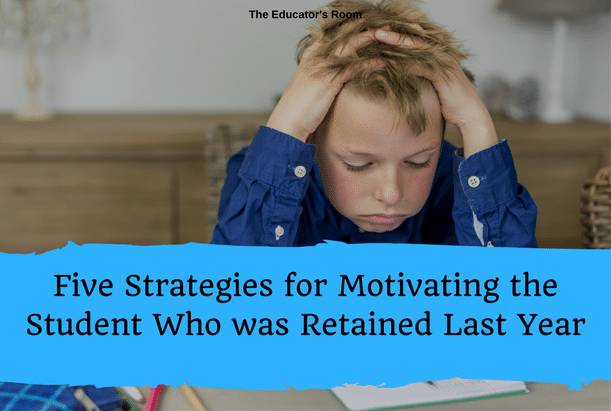Have you ever been saddled with a student who failed the previous year in your subject and found that they were either just as motivated or less motivated than the year before? Yeah. Me too. I took some time to research some strategies that will help us motivate those students who just didn’t make it the year before and got retained. These strategies are geared toward students who failed due to lack of work ethic, not lack of ability. That’s an article for another day!
Five Strategies for Motivating the Student Who Got Retained Last Year
So you got the student who got retained last year. Now what? Well, more than likely, the student is more of a reluctant learner than a slower learner, so how do you get them engaged in learning?!
1. Give them a challenge
Just make sure the challenge is appropriate to the developmental level of the student. Otherwise, he/she will tune out. If it’s too difficult, the student will give up. If it’s too easy, the student will wonder why he/she should even bother with such a menial task. In other words, figure out where your students are at before providing the challenge. As they begin to get comfortable with the challenge, up the ante so that they never get bored with what they are doing. Plan for the highest level and differentiate as needed for students who work at a lower level. This will help make the task easier.
2. Don’t Give Questions with Yes/No Answers to Students!
You’ll find students hitting the snooze button often if you’re only asking questions at the declarative level. Students need to utilize higher order thinking skills often to remain engaged and to learn new information. Memorizing information works well for the beginning of a task, but students really need to dig deep and learn more. Puzzles and challenge questions can be intriguing for students and keep them engaged in learning.
3. Group Work Does Work!
That said, some students, including the retained students are more likely to tune out and let everyone else do the work if put in large groups. Stick to groups of three or, even better, partner work. Give students a slightly different task than the students nearest them and make them communicate with one another. Students can learn a lot from each other. Additionally, many students crave social time, and putting them together not only increases their knowledge base, but allows them to scratch that itch for social attention.
4. Have Students Compete…With Themselves!
Competing with other students or other classes can create an intimidating situation for students, especially if they got retained the year before, but having them beat their own personal record? That’s another story. Track student data and hold conferences with students where they can talk about where they are at and where they’d like to be. While holding these conferences, other students may work on challenge puzzles or individual assignments they are able to complete without disturbing you. Help students keep track of their own personal best and motivate them to beat their own record. You’d be surprised to see how far they’ll go, especially if you’re graphing the data and they want to see their lines go up, not down.
5. Keep it Real
When you teach a subject that most students have a difficult time connecting with personally, like math, it’s important to show them the relevance of their work to the real world. Give them problems where they figure out how much they’d owe a creditor, how much they’d need to tip at a restaurant, and there are so many other real-world tasks that can help ground even retained, reluctant students into the reality that what they’d doing is important to them. Once you hook them, they’ll learn whether they set out to do so or not.
Final thoughts
While it seems a bit odd to think that you can motivate the unmotivated student by making them work harder, research does suggest that students tune in more when they feel challenged. Additionally, putting them in groups and giving them real-world tasks help them see how they can apply what they learn in a more relevant way. In the end, you may or may not hook that reluctant learner into loving what you teach, but these strategies are a good way to ensure more success with them.








I hope you just made a poor choice of words. A teacher who feels like they are “saddled” with a child shouldn’t be in the classroom.
I agree that some children are harder to teach than others and welcome strategies to help improve teaching and learning, but no child should be considered a burden in a classroom.
For the future I would suggest you use a word like “challenged” rather than “saddled” as in, “Have you ever been challenged by a student…”
Personally, I don’t believe retention serves anyone any justice–including the poor student who is “saddled” with another year in the same grade level learning the same curriculum. Research doesn’t back retention. And it is a “challenge” for everyone involved, but especially for the teacher who has to try to find new, inventive ways to reach the student who resents spending another year learning the same things again. It doesn’t mean you don’t like the student or that the task is insurmountable, but rather that it’s a huge obstacle to overcome.